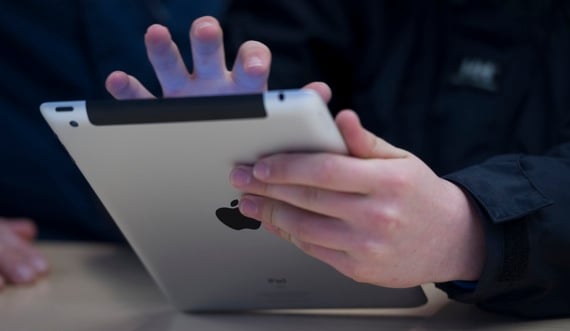FAA rethinking rules about use of mobile devices on planes; more leg room in coach would be nice, too
The Federal Aviation Administration announced this week that it plans to review its rules governing the use of portable electronic devices, such as tablet computers and e-readers, during flights.
This is overdue, and we hope it can resolve a contradiction at the heart of the current policy: If electronic devices are truly dangerous, why aren't officials taking them far more seriously? And if they're not dangerous, why can't we simply be left alone?
The study will gather mobile-technology manufacturers, aircraft makers, passenger advocates, and pilot and flight- attendant groups. It will re-evaluate the process for determining which devices might interfere with planes' instruments, consider new standards for aircraft-friendly gadgets and recommend possible regulations for what emissions new aircraft should be able to withstand, among other things. It will issue results after six months of study.
Which is excellent news -- because what's needed more than anything on this issue is real data.
Under current policy, the FAA requires airlines to determine whether radio-frequency emissions from a given device cause interference before allowing its use during takeoff and landing. This means that the airlines, without the capacity to test an ever-proliferating variety of gadgets, typically ban everything during these phases of flight.
Makes sense, no? Except that there's no conclusive evidence that any of these devices have caused dangerous interference.
No Evidence
A confidential survey conducted by the International Air Transport Association, an airline trade group, and obtained by ABC News last year, found 75 incidents from 2003 to 2009 in which an electronic device was suspected to have interfered with a flight's controls, communications or other equipment. The report relied on anecdotal information from pilots and crews, however, and didn't confirm that any of the incidents was actually caused by a passenger's device. Given that 72,462,640 passenger flights departed from U.S. airports alone in that period, according to the Bureau of Transportation Statistics, this is hardly convincing evidence.
Which is probably why airlines don't take the bans particularly seriously, as you might have noticed when you accidentally left your iPad on during a landing. Neither does the Transportation Security Administration, although surely an enterprising terrorist could fire up a modified Kindle during takeoff.
Neither, most critically, does the flying public. A 2006 study by IEEE Spectrum magazine found that on average at least one passenger uses a mobile phone on every flight. (Mobile phone use on planes is banned by the Federal Communications Commission and won't be considered in the FAA study.) Other electronic devices are used much more: A DePaul University study this year found that 28 percent of airline passengers used them during flight in 2011, up from 18 percent in 2009. How many of those people remembered to shut everything down in time for takeoff and landing? How many will in the future, as the devices become ever more common?
You may argue, correctly, that it's no great sacrifice to follow the airlines' rules for a few minutes. It's annoying to stay disconnected while taxiing endlessly, and it means lost productivity for frequent business travelers, but neither concern is beyond the human capacity for suffering.
What we're more worried about, however, is that millions of passengers each year are forced to obey these mandates on flight after flight without any data suggesting it makes sense. And that millions more flout the rules every time they fly -- suggesting either widespread disaster waiting to happen or much ado about nothing.
We suspect the latter, but would be relieved to have real evidence.
--Bloomberg News--
(This editorial was written by the editors of Bloomberg News. The views expressed are theirs)







